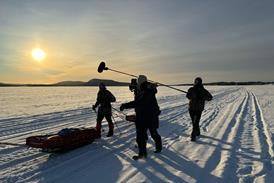The panel
Carl Franklin was technology editor of Broadcastfrom 1995 to 1997. After a decade in journalism he left Fleet Street to work in the City, where he is now a technology analyst at Bridgewell Securities. Carl is also the author of a book on failed consumer technologies, entitled Why Innovation Fails.
Chris Daubney has had a 35-year career in TV and radio, including positions as chief engineer for Channel 4 and managing director of Panasonic Broadcast Europe. He now runs a strategic and management consultancy and in 2003 helped form Quercis, a consultancy, conference, event and training company.
Paul Marks is a journalist who has edited magazines in the computing, telecoms and broadcasting technology arenas. He joined New Scientistin 1998 and is now its chief technology correspondent, as well as a technology commentator on Richard and Judy, BBC Radio 5 Live and Radio 4.
Dan Taylor provides our "man in the street" perspective, and gives a purely consumer reaction to the BBC's innovations. A self-confessed TV addict and technology junkie he has worked for six years marketing computer games and is now European product manager for Sony PlayStation.
Internet TV
The Vision
As broadband access grows, audiences will increasingly use the internet to search for and play archived programmes and watch channels live. They will potentially be able to access any channel in the world (access permitting) and use an internet-style search engine to find programmes they want.
The Reality
Of all the BBC's new media strategies, this has had the most development recently, with director of television Jana Bennett announcing her desire to "simulcast" BBC1 or BBC2 online within a year.
At this year's Edinburgh TV Festival, director general Mark Thompson announced the corporation's intention to develop MyBBCPlayer over the coming year - effectively a search engine for audiovisual content. Such technology will put it into direct competition with Google and Yahoo, which have developed a similar concepts.
MyBBCPlayer will be a piece of software that will allow users to search for programmes. Initially it will be searching among a seven-day archive of BBC programmes, but the corporation believes the player will become so ubiquitous that other broadcasters will make their archives available through it as well.
It will also play live streams from BBC channels and, again, the corporation believes other broadcasters will add live streams of their channels as the player takes off.
And unlike the media centres developed by Microsoft and its partners such as Sony, Toshiba and Dell, the BBC's offering will be a freely downloadable piece of software, rather than a piece of hardware sold to consumers.
One of the keys to making the player work is making it compatible with any hardware capable of playing programmes - including computers, mobile phones and conventional TVs. The corporation is working with Digital Living Network Alliance - a conglomerate of some of the world's biggest technology companies including Sony, IBM, Nokia and Microsoft - to ensure MyBBCPlayer's compatibility.
Significantly, the concept means a move closer to the commercial sphere for the corporation. If it is to become a global success MyBBCPlayer will need to make it easier for users to buy programmes and subscribe to channels, and premium programmes from the BBC's own archive - such as high-selling series like The Office- are also likely to have a price tag attached.
This sets it apart from, for example, Yahoo's offering, which at the moment does not charge for clips.
A "dumb" version of MyBBCPlayer - the corporation's interactive Media Player (iMP) - is due for trials over the next few weeks. The iMP gives the 5,000 users involved in the pilot access to seven days' worth of BBC programming, but no live streams of channels and limited search ability.
Our Panel Says
The key issue for our panel here was money - both in terms of protecting programme-makers' income from rights and making sure that licence fee-funded programmes did not leak out to non-licence fee payers. As one panellist pointed out, it is easy for computer users outside the UK to fake their computer's IP address, and even within the UK, not all computer users are licence fee payers.
Labelling programmes to make them easy to find was also pinpointed as an issue. Systems such as Yahoo's use closed caption data to search video clips, but MyBBCPlayer would need a far more sophisticated system.
And one panellist also pointed out that, against competition from technology giants such as Microsoft, Apple and RealNetworks, MyBBCPlayer will need to be very impressive to have global appeal.
Interactive TV or 'Enhanced' TV
The Vision
Rather than passively watching programmes, viewers will get involved, mixing footage from different cameras to create their own programmes, watching alternative endings and voting for plotlines they'd like to see and sending clips of programmes to friends.
The Reality
This field has also been given a big push by senior BBC execs, with director of television Jana Bennett announcing TV Plus - a major pilot, which runs until Christmas this year, aimed at expanding the BBC's existing interactive strategy.
At the moment its interactive services are available to anyone with digital television - around 60% of the country. Its most high-profile successes have been events like the Glastonbury Festival and the 2004 Olympics, for which nearly 14 million people took advantage of interactive add-ons.
But the corporation has learned some important lessons along the way about giving too much to audiences.
"The first Fame Academyapplication had everything - behind the scenes information, character biogs, highlights, ability to vote," says BBC head of interactive programming Emma Somerville, part of the TV division. "The next year it had the live stream from the house. And it got exactly the same number of people using it."
Now the corporation wants to take its£14m-a-year interactive operation beyond standalone live events and make it a regular habit for TV audiences. Its biggest experiment so far in this direction has been Kudos- produced drama Spooks- for which interactive watchers could undertake spy training using their remote control.
TV Plus has given this drive even more impetus. The pilot aims to find out what types of interactivity audiences want and Bennett has said she wants to put interactivity into the minds of programme-makers and commissioners at a much earlier stage.
Crucially, TV Plus also sees interactivity branching out beyond the red button services into broadband - for example, the Spooksgame is to be given an online version this year.
Moving interactive TV beyond the red button is important for three reasons. Firstly, only Sky's red button service has a return path, allowing users to vote live, for example. The BBC has to make its inter-activity compatible with all services - Freeview, cable and satellite - and this limits what it can offer (voting for a Freeview programme currently has to be done by phone).
Secondly, future audiences may not be watching programmes solely on television. Interactive elements have to work on all devices, including computers and mobile phones.
Thirdly, interactive offerings have so far been bound to linear TV schedules. The only window
for audiences to be spurred into interactivity is in the gaps between programmes. The web and PVRs open up a whole new level of participation and the BBC has already conducted trials with NTL and Telewest, testing interactive elements on on-demand TV.
Our Panel Says
The main concern for the panel was in making the interactive offering compelling and appropriate, rather than simply "also-rans" tacked on to the programme as an afterthought.
The main dictator of this, the panel felt, should be the audience. But with a wide range of extras potential in each programme, there was concern about whether the interactive offering would exceed audience demand and have appeal to more than just avid fans.
Technology teams are eager to push the envelope, but as one panellist pointed out "in many cases, the only technologies people want to interact with while they're watching TV are the ring pull and the remote control".
Mobile Technology
The Vision
Mobile phone owners will be able to watch live streams of channels on their phones, as well as being able to search through TV archives.
The Reality
Of all the ideas being looked into by the BBC, this is at its earliest stage, despite clips from BBC comedies being available on mobiles as part of its TV Plus pilot.
The corporation splits out its mobile services according to complexity - sending out SMS text news alerts or asking listeners to text Radio 1 are the most basic and popular. Next up the ladder of complexity, the corporation has adapted many of its websites for viewing on mobile phones.
But what most people think of when they talk about the mobile revolution is actually watching programmes on a handheld device.
The corporation has been experimenting with this for several years and is now working on a mobile strategy expected by the end of October. Again, the Olympics provided a chance for trials, and clips from the Grand National were made available over phones for the first time this year. But compared with internet, the usage figures were tiny. The Grand National, for example, was only available to an audience of 500.
This lack of widespread appeal is clearly a hurdle for the BBC's mobile aspirations, as is the fact that it is afflicted by the same debate around rights as the MyBBCPlayer.
Another obstacle is competition. The corporation is intensely aware of the effect it could have on the market, and wants to avoid the mistake many feel it made with the internet - charging in and skewing the market.
Compared to the internet, the mobile phone world is even more crammed with major names competing for space. Any announcement from the BBC will be scrutinised and it wants to get its ideas right before risking treading on any toes.
Another hurdle for the BBC is the sheer complexity involved: to publish a five-minute clip of the latest comedy, the corporation must jump through a series of compatibility hoops - making sure it works with the multitude of handsets and mobile service providers in the market.
All of this costs money and this is perhaps the most difficult hurdle. The corporation's new media team must convince the governors, in the face of public apathy, technical complexity and competition worries, that broadcasting anything other than short clips is worth the cost.
Our Panel Says
This strand found the least favour with our panel. The main concern was whether consumers would be grabbed by the idea of watching anything other than small clips on phones, especially with handset sizes ever decreasing.
They agreed that some form of mobile phone viewing would take off, but as one panellist commented: "It would seem that the majority of consumers like using their mobile phone for (surprise, surprise) phone calls."
Television on Demand
The Vision
When computer memory prices drop to the point where massive amounts of programmes can be stored, viewers will have ever more sophisticated ways of navigating them. They will be able to go straight to David Brent's dance in The Officeor call up all programmes featuring Bruce Forsyth for example.
The Reality
The BBC insists it is not interested in moving into hardware production, but its new media division is investing tens of thousands of pounds in a prototype called Pandora.
The device - being developed by tech company Promise TV - records a week's worth of digital terrestrial television output, and then stores it on a massive 3 terabyte hard drive.
Unlike Sky+, future boxes will not have to be told in advance what to record, they will simply store the lot and let the viewer decide what to retrieve. That's where the BBC's interest in Pandora comes in. The whole point of the project is to develop sophisticated new ways of finding programmes among the mass of recorded content - and making sure BBC programmes are clearly labelled and easily found.
Its development team has taken the prototype device and is experimenting with different ways of searching through the thousands of hours of programmes Pandora stores.
The key sticking point here is the way programmes are currently labelled. Each one is broadcast with metadata, which identifies simple facts about the programme - channel, date and time and so on.
If the BBC is to develop a more intricate way of navigating through programmes, the metadata is going to have to become more specific, identifying genres, country of origin and even talent in the show. Pandora's testers believe metadata will eventually come in at the production stage, with individual scenes in programmes being tagged for easy access.
The corporation wants to be at the forefront of work on metadata - partly to make sure there is a way of making sure viewers are always able to find its programmes.
Our Panel Says
This was the piece of research which drew uniform praise. The idea of the BBC taking it upon itself to comprehensively label its programmes - and develop a competitor for Sky's EPG - found favour, but only if it was going to be shared with PVR manufacturers.


























No comments yet